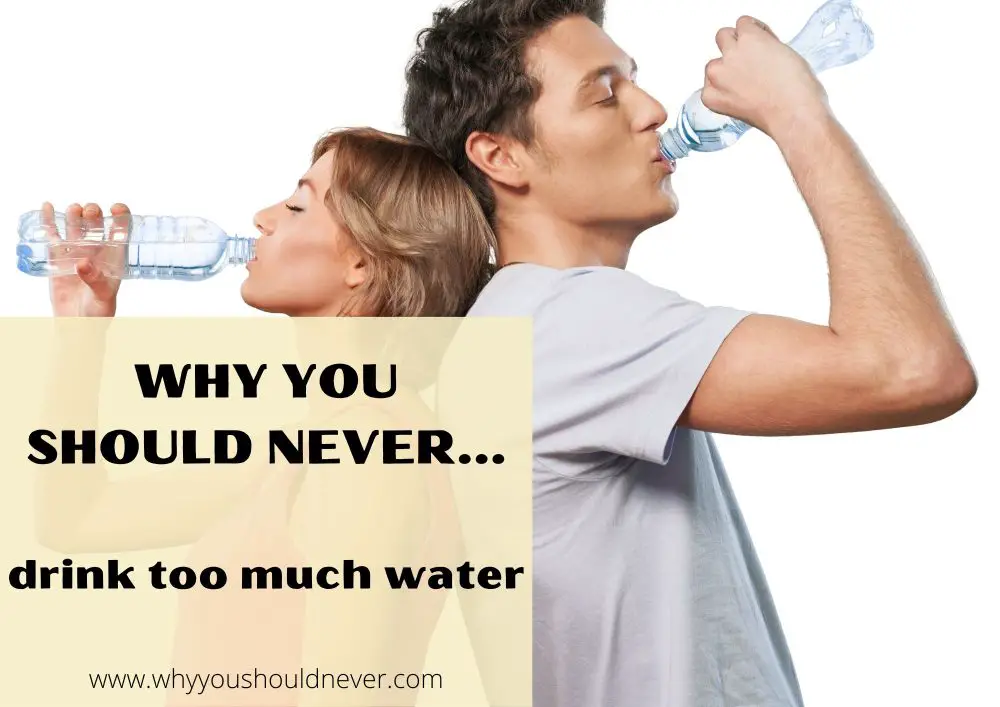![]()
Why You Should Never Drink Too Much Water
Water, the elixir of life! The most important substance on earth! The one thing we, and practically every other living thing on the planet, literally cannot live without!
Day in, day out, we hear the same message: drink more water! And we oblige, filling up our glasses and chugging it down like there’s no tomorrow. Common advice tells us to drink at least 8 glasses of water a day.
And while water is great and should be the go-to beverage for every human being, is there such a thing as drinking too much of it? As it turns out, yes, there is. Let’s explore below.
8 reasons why you shouldn’t drink too much water
1. You could dilute your blood
While it’s important to stay hydrated, drinking too much water can lead to overhydration, which in turn can lead to a condition called hyponatremia. This occurs when the sodium in your blood becomes diluted due to excessive water intake, leading to symptoms like headaches, nausea, and even seizures.
2. Most water isn’t actually that great for you
Believe it or not, the water you’re drinking may not be as pure and healthy as you think. Many municipal water sources contain pollutants like lead, chlorine, and fluoride.
Bottled water isn’t much better, as it’s often just tap water that’s been filtered poorly; and by remaining in the plastic for long periods of time, contaminants enter the water.
3. You’ll be running to the bathroom more often
Drinking too much water will result in frequent bathroom trips. The inconvenience of this can’t be overstated, especially if you’re in the middle of an important meeting or event, or simply if you’re trying to sleep. Who wants to be woken up by an overflowing bladder in the middle of the night?
4. You could damage your kidneys
Your kidneys are responsible for maintaining the correct balance of fluids in your body. Drinking too much water can put undue pressure on your kidneys, leading to damage over time. This is especially true if you have an existing kidney condition.
5. You’ll feel bloated
Drinking too much water can lead to water retention, which can make you feel bloated and uncomfortable. This is because your body will hold onto excess water, which can cause swelling in your abdomen and other parts of your body.
6. You could disrupt your electrolyte balance
Electrolytes are minerals in your body that help regulate important bodily functions, like muscle contractions and nerve impulses. Drinking too much water can disrupt the balance of electrolytes in your body, leading to symptoms like muscle cramps and fatigue.
7. You could ruin your appetite
Over-consumption of water could cause a loss of appetite. Water can take up space in your stomach, leading you to feel full and less hungry. While this might not seem like a big deal, constantly drinking water instead of eating will eventually lead to malnutrition and unintended weight loss.
8. It’s bad for the environment
Finally, drinking too much water can have a negative impact on the environment. The production and distribution of bottled water requires a significant amount of energy and resources, leading to increased carbon emissions and waste.
Then there’s the issue of plastic. Although many plastic bottles can be recycled, a large percentage still ends up in landfills and the ocean, where they can take hundreds of years to decompose.
Final word
I know, I know, we can’t go a day without being told that something we love is bad for us. But don’t despair! It’s still important to stay hydrated, just in moderation.
At the end of the day, water is still, by far, the best thing you can drink. It beats all sugary drinks or artificial beverages by a mile.
If you want to ensure that the water you’re drinking is as clean and pure as possible, consider investing in a quality water filter. Not only will this help remove any harmful pollutants, but it can also save you money in the long run by reducing the need for bottled water. The environment will be better for, too, as you’ll be producing less waste.




